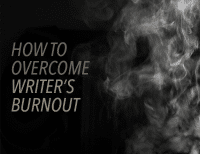As writers, we often draw from what we know to create our art, and the subject many of us often know the deepest is our family. But how do you write about your family without hurting them, especially if, like most of us, your family is less than perfect?

Don't Be Afraid to Write About Your Family
Writers have always written about their families. Famous authors like Pat Conroy, Anne Lamott, and Ernest Hemingway used their lives, and the lives of their families, as the basis of some of their best stories.
Pat Conroy, author of The Great Santini, says, “My books have always been disguised voyages into that archipelago of souls known as the Conroy family.”
The problem with this is that not everyone likes being written about—especially when they are portrayed negatively.
To contrast that, author Anne Lamott says:
You own everything that happened to you. Tell your stories. If people wanted you to write warmly about them, they should have behaved better.
Three Tips to Write About Your Family Safely
While this it true, through writing my own memoir, I have come to find that we can handle these situations in a way that doesn't leave a wake of destruction.
1. Give Background
Is evil born or created? That might be up for debate, but what isn't is that there is always a deeper reason behind the evil. I've found that giving background of a character is essential to creating depth in your story, and needed in order to be truthful.
I could write pages and paragraphs about how it might have been wrong how I was treated as a child, but that wouldn't be the whole story. The whole story would be that my parents were abandoned and hurt from their own youth, and had never healed. Infected wounds only infect more and grow more painful.
There's a reason for everything our characters do, and we need to create and portray the motive behind their actions by providing their side of the story. There are two sides to every story, and one-sided stories have no depth, and barely any truth.
Giving background is what creates a whole, deeper story. It will give your reader, and you a better understanding of the bigger picture.
2. Have a Conversation
I speak of my parents in my memoir occasionally. I edited my memoir over the last few months, and added in the appropriate background information about my parents.
Now, the reader could understand why my parents did or said the things they did. What was missing was my parents knowing why they acted that way, or perhaps it was why I needed to tell the story.
So here is where I propose we have a conversation. The goal of the conversation: to show your heart behind why you are telling your story.
I was skeptical of this idea at first. With a rocky relationship with my parents to begin with, I was unsure how a conversation about me revealing our family secrets was going to go.
To my surprise, after I explained that I wanted to share our story to inspire and encourage others, they were supportive. They joked about the ridiculous things my mother says and how that deserves a book of it's own.
This step is especially important as you approach the publishing phase. Having a conversation prepares the person, and is a professional way to approach the situation.
To be honest, it will also relieve some of your stress. Whether the conversation goes well or poorly, you know what their reaction will be, and they know the deeper reason you want to share the story.
3. Forgive
While researching different writer's lives I came across this quote from Pat Conroy:
And, you know, it's a strange power a writer has. But the one thing that surprised me in writing it is that with all the violence we endured, with all the craziness – and my God, my family is nuts – that we survived. And there's something that moves me every time I get together with any of my siblings. We'll talk about mom and dad, but there's something about it that is quite moving to me in the fact that, you know, we have forgiven them.
It's true, a writer holds power, because words are powerful.
The biggest key to writing about people that have hurt you is the forgiveness that comes with it.
Once you write about them and begin to give the other side of the story, empathy comes. You may begin to understand that the other person was hurt, confused, or needed help, and sometimes it becomes easier to forgive.
They become more human and less villain.
What do you think? What has your experience with this been like? Tell me in the comments below!
PRACTICE
Take fifteen minutes and practice writing a background for one of your characters. Explain why they might act or speak a certain way. Post your practice in the comments below!







Oh, my gosh! Wish I had seen this a month ago. . .or maybe it’s just as well I did not. I completed my own story and it is with my publisher now. The agony and self-discussions on whether or not to write the “real” story was, at times, overwhelming. But, I plowed through, writing of an incidence, editing without success, deleting it, and starting anew the next day. I focused on somehow telling the truth without throwing anyone under the bus.
I had nightmares about distant relatives coming after me with condemnation for the negative things I sometimes had to pen, and dreamed of a conversation where my sister and daughter disowned me. Of course, none of that happened, thank goodness.
The fun thing about your article is that I believe I succeeded in the areas you mentioned. I found forgiveness for them through writing, searched into their pasts to figure out why they did what they did, and things resolved themselves in my mind beautifully at the end. Three reviewers thus far tell me the book accomplished all of my goals, while saying nothing that did not glorify God. (At least I think so.)
Rhonda, That’s so great! I’m glad you wrote your story. That’s awful that you had nightmares, but I totally understand 🙂
I’m so glad you succeeded!
Thanks for sharing!
Well my family continues to be dysfunctional, in ways that are more unbelievable than fiction! I would not write the whole ugly truth until they are gone! But I am going to pen a short story about their latest dramas and how unbelievable some of their actions and motives are! I kind of find them funny, now that I am not the center of the mayhem! Be back to post this later…if I can ever find my way back here! Great tips for Memoir writing. Dawn BROCKMEIER
I found interesting the thought that “if the person did not want negative things said about them, they should have acted better.” Had not thought about it that way.
I write true stories about my grandchildren for a Christian
magazine. Some stories are about adversities and how they worked things out.
Now a couple of the grand kids are adults, and I send them the published
articles. Neat grandma they tell me.
Helene! That’s really great!
Keep writing those stories!
Thanks for sharing!
Thanks, Kellie
love this Kellie! so proud of you!
Thanks for your encouragement Meg!
Thanks for sharing these tips. I am writing a memoir and was wondering how to best tackle this challenge. The conversation with my father will be the hardest thing to do.
Bettina,
I’m glad you found the tips helpful. The conversation is hard, I know, but worth it in the end.
Interpreting the prompt to not be exclusively for real people and just writing a background:
As he walked along the long road south, Joshua remembered being loved. He remembered a comforting pat on the back or a tight hug, and sometimes he just thought about how eyes could convey such emotion when all they did was look.
He took a drink from the tin bottle he had brought with him on his trek then continued on. Raised in the north, he had been used to the cold, but there was something wrong about a winter in the south. It was a parody of everything the south should be, and it cut deeper than any northern wind ever had. But not as deeply as some things.
What was it about Josh’s neighbor that attracted his wife so? What was there that Joshua didn’t have? He was kind, handsome, and smart. Not overly rich, not poor. He carried a little bit of emotional baggage from his dad being locked up, but nothing heavier than the occasional fear of bad genes.
A car pulled up beside him and offered him a lift. He gratefully hopped in. The driver asked for one thing in return: a story. Joshua’s story. So he told it.
His parents had met at a concert in Nashville. He tried swiping her purse and she threw him on the ground. Quite comical. He got away from authorities but was later found by Joshua’s mom. She was more than a little shocked when he stole a wallet and used the money to feed a little girl on the street. They both agreed right then that she needed help, and they both promised to help her. Four months later they were married and the girl was adopted. Joshua was a year behind.
They lived well until his sister got sick. Some chronic thing the doctors attribute to her time on the streets. The medicine was too expensive, so their dad put on his old mantle and tried to acquire it in a more exciting way. Thing is, he got caught, and the companies that own our government made an example out of him.
Joshua studied hard, wanted to be a lawyer and free his dad, or at least spare people the same fate. That fell apart when he got dumped for his neighbor. He felt it shouldn’t have hurt as bad as it did, but that didn’t stop it. So, he went to walk it off, and kept walking.
This has great bones, and I’m very intrigued to know more in depth about Joshua’s parents’ story. That in itself would make some great chapters!
Hi
I heard, once, one of my brothers expressing his despise towards writers who write about their family or their relatives. It was a message sent to me as my brother knows that I write (in fact i haven’t found a publisher yet). I have 6 novels (5 in French and one in Arabic). My family is the background of all of them. In the novel written in Arabic i made all my soul to talk about the mistakes of my parents. The only one with whom I had a conversation about the topic is my mother. She encourages me to continue.
Madani,
Keep writing, your story is worth being told. Try having more conversations. I’m so glad your mother encourages you.
Thank you for sharing!
Madani, it is so important to have a support group,
especially a mother and with me my children.
Hi, Helene
Permit me to send you the following quotation :’
‘ At the age of two we say to our mother MUM.
At three we say Mum, I love you
At ten Mum anything
At sixteen God Mum irritates me
at eighteen I want to leave this house
At twenty five Mum you were right
at thirty I want to return to my mother
At fifty I don’t want to lose my mother
At seventy Ah if my mother were here’.
Helene
I am 61 and strated to really communicate with my mother after my father’s death, that was ten years ago.
I found in her the treasure I have always sought for, especially as a writer.
Madani, there is a life-story in this short quotation; thanks for sharing.
I wish my mother could sit by me and share all my thoughts.
I wish I could make it up to her for all the thing I didn’t do.
Why do we realise too late how precious and wise our mother are?
However, though some memories are mixed with nostalgia and regret, but there are also remembrances of love and laughter.
Hi Madani,
That is a beautiful poem. As a mother I’m always supportive when my children start a new endeavor. I’am happy for you that you have such a great relationship with your mom.
Keep writing.
I would like to write about my family but it’s complicated. We are (were) five brothers and two sisters and each one has immigrated to different countries. We try and keep in touch through email, Skype, land line phones, but we hardly ever meet personally.
However, our early years hold us together by unforgettable memories and some of my sibling still nurse grievances, which I don’t.
Apart from this, where do I start? Most readers will be unfamiliar with the country of my birth, especially the customs and life-style. Do I need to write an introduction to explain these differences?
I would appreciate some help and suggestions.
I would say not to write an introduction about the differences, rather write a short story of a memory of your family that includes these stories in the opening. It can be funny, sad, or both. This could be a more interesting start. Then you could continue showing the differences throughout the book. 🙂
Thanks, Eliese, for this handy tip.
How about foriegn words which dot our conversation throughout? It is better to put the meaning in brackets or make a glossary at the end of the story?
Out of those options, I would say brackets. I wouldn’t want to look it up everytime. Also you could do something along the lines of, “Shcho, shcho, shcho?” my sister asked ‘what’ in the rapid Ukrainian that sometimes spit out of my family’s mouths. Just an example 😛
Thank you, Eliese, I like this suggestion. I will certainly use it.
Raven sat on the roof, a half empty bottle of vodka resting patiently between her hands. She looked about her neighborhood, just able to make out the outline of a roof or a pond in the dark of 4:00am. Landscape, vodka, window, vodka, ground. Her eyes traced this pattern a few times as her breathing slowed and her thoughts settled.
“I don’t want to be like you.”
The whisper was a shout inside her head, a desperate mantra she had always repeated at times like this.
“I’m not going to be like you, mother. I’m not going to shut out the world. I’m not going to hide in a house and drown myself in a bottle and keep my kid trapped with me.”
The bottle continued to wait, listening, the clear liquid still with boredom.
The wind picked up, sending a stray leaf skittering across the shingles. She drew her knees into her chest, and for a moment wished someone was with her. For just a moment she wanted her mother, the mother she knew before her stepfather broke everything her father had fixed.
“It isn’t your fault.”
She sat up, slowly, and hurled the vodka bottle against the neighbor’s house, not caring if it woke them up.
“Damn it it isn’t your fault! It’s his fault for hurting you like your dad. But he isn’t here anymore! He isn’t here, and I’m the only one left. I’m the only one. I’m the only one.” Her shout faded into the dark, carrying the realization along, passing it to the water and the trees and the wind.
She grabbed her bag and slid off the roof onto the car with tears in her eyes. With shaking fingers she switched on the ignition and locked the doors.
“But now you’re going to be the only one. And I’m sorry, but I… I’m going to be the last one to leave you. I need to run. I need to start over, because I can’t live like this.”
I really like this piece, Lauren. Among others, I like the personification of the vodka bottle, and “The whisper was a shout inside her head”; “It isn’t your fault”‘ Her shout faded into the dark, carrying the realization along, passing it to the water and the trees and the wind”
The depth of the emotions is front and center. The complications of unwanted twists of life and lost alternative life stories is countered by the hope of creating a different future for herself.
A very powerful, gripping, gut wrenching story filled with raw emotions.
What a great article.
What’s inspiring is that the tips and suggestions you offer for people who are writing memoirs applies equally well to novelists. Thank you!
Thanks Carrie!
I’m glad it offers help to memoir-ists and novelists! 🙂
I appreciated this article. When writing my memoir, I found a couple of conversations I had with my brother interesting. Everyone sees things differently. And a couple of smaller points I conceded with. Did I need to? No, not really, but because they really didn’t matter, why not honor him with the way he remembered it? I love what you said about showing depth to the person you are writing about. The reasons behind some of the actions.
My nephew gave me valuable feedback after reading a draft of my book. He thought I would want to create depth by explaining more about one of the people in my book. Because he knew what I wrote was not the whole story. So I took his advice and added a few things and it helped so much.
One thing I learned from seeing the movie, Malificent was exactly what you mentioned, with a villain, there is always a reason why. Thanks for your post.
Jim Allen
After thinking about it for some 50 years, I recently began writing my memoir. A primary inhibiting factor has always been my fear of how my family might react to my portrayal of them.
Despite the fact that we began life as wombmates, anyone listening to my twin sister and I talking about our childhood, might have had difficulty believing that we grew up in the same family. So it was with great trepidation that I asked her to listen to the podcast of a reading I had done on local radio. Imagine, if you will, my surprise when she was moved to tears by the “honesty,” of my portrayal of her as a spoiled prima donna. Later my older brother was also moved to tears on reading about the void remaining when he left home at the age of 14, just as things were beginning to unravel back home.
In the meantime, my siblings have become my biggest supporters, not only providing validation but also memories, photographs, invaluable historical information, as well as loads of new material.
Despite having experienced virtually every modality of psychotherapy in preparation for my own career as a psychotherapist, the process of writing about my life has also proved to be my most profound therapeutic experience to date. My only regret is not having begun the process much earlier while my parents and other brother were still alive and able to participate.
Hi Jim,
Like you, I have a desire to write about my family, but unlike you, I did not grow up at home, and yet our whole family had strong feeling of belonging together.
I have started my memoir. I must hurry because I’ve lost all family members except a sister.
Writing from my POW would be one-sided, which I regret, but being out of the family since the age of eight makes me miss out on details of the other family member’s lives.
Thanks for your reply.
I think that your story is rendered even more significant and poignant by virtue of your unique circumstances. It is a story that only you can write. And a story that you can only write from your point of view. As a young girl growing up you must have had many unanswered questions and theories about why events happened as they did. I would encourage you to share your feelings of confusion about all this.
In my case, my twin sister and I have both come to the realization that our points of view, while markedly different, are equally valid because we grew up in separate realities. If that is true of twins raised together it is certainly true of siblings separated at an early age.
The Life And Times of Alfredo Dante
by Kiki Stamatiou a. k. a. Joanna Maharis
Alfredo Dante grew up in an unconventional family. There was violence in the household going on even before he was born. It carried over into his own life as he grew older, even through up through the time he was a teenager, he was gentle by nature. However, he grew up to be so sensitive to given situations, he’d often
handle his problems using his fists, often landing him in jail and with the
wrong crowd.
Upon getting released from jail by some long time school friends, he often met with them to do drugs and drink. He did this to take away the pain of his painful past of growing up with a father who was violently aggressive and always blamed him for the death of Alfredo’s brother.
As he got older, Alfredo was in and out of jail, spending a great deal of time going from job to job, until he wasn’t able to obtain employment. Getting high on drugs made him disillusioned, and often dangerous to be around.
One day he went to the house of his neighbor and friend Fred, and told him in a dangerous voice, “I want you to stop hassling me, and quit talking about me behind my. You and Cal put listening devices in my house, and laugh at me behind my back,” as he shoved Fred and punched him in the face.
“Alfredo, I don’t know what you’re talking about. You and I have been friends for a long
time. We grew up together. How and why would you think I would do such a thing to you. I never did any of those things you’re accusing me of? Look. I advise you to leave my house right now, before I’m forced to call the police. I don’t want to do it, Alfredo, but if you leave me no choice, I will. So, I suggest you go home, calm down. When you’ve come to your senses, come see me. Then, we’ll talk,” Fred shouted,
while shoving Alfredo out his door.
Alfredo went home, to an ax, and headed back over to Fred’s house. He took the axe and smashed in the windshield on Fred’s car. He also bashed in the head lights, and broke the rest of the car windows, signal lights and tail lights.
Soon afterwards, the police showed up, placed him under arrest, read him his rights, shoved him into their police car, and hauled him off to jail.
Alfredo was exposed to drugs at a young age of 13 years old, when he fell in with the wrong crowd. The same friend who called the police on him was the same friend who introduced him to drugs and got him hooked on them. As Alfredo got older, he became more and more disillusioned, not only from the drugs he was taking, but also resulting from the traumatic aftereffects of the violence and abuse he endured at the hands of his parents when he was growing up.
© Copyright, Kiki Stamatiou, 2015
Seems to me you are all pros at writing , for me to write like this would take a life time, but yet my story should be told just like others,and the abusers . and Molesters can mess a Child life up so bad just because there life was Horrific , so the Cycle Continues except for my self I had broken the Cycle and lost all family because of truth, then what would the sence of me writing my true story
I find, in writing stories about.for people, they don’t recognise themselves. Time passes as you are writing, and they’ve already moved on with their lives. Plus, they/we see an idealised version of ourselves to some degree,
Mind you, I haven’t started to write about MY family yet. Think the bubble may well burst!